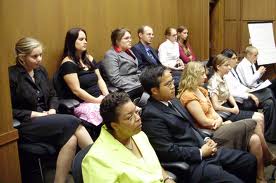
Last year for the third time in six years, I was called for Jury Duty. Each time it has been an educational experience in so many ways. Where I live, Jurors are chosen from lists of adults who pay taxes, vote, and drive. The call to serve cannot be closer together than two years, and it was actually unusual that I was called to serve three times in such a short period of time.
I was called for four cases during the two weeks. I was the extra juror on one and was dismissed prior to deliberations after hearing the challenging case. The first one was a murder case and was difficult in so many ways. And yet decisions needed to be made. Service as a Juror is a public privilege and serious responsibility. We should all reflect on the fact that not every country around the world allows cases to be determined by a “jury of peers.”
Before Jurors are seated in the Jury box, a larger group of potential Jurors are asked about previous experiences and relationships which might bias their ability to make fair and impartial judgment. That group is questioned by defense and prosecution attorneys. Any potential Jurors with questions or notable responses may be asked to approach the Judge’s bench for a private conversation with the Judge and attorneys.
Because of their responses, some potential Jurors are released from serving by the defense and others by the prosecution. The needed number of Jurors are randomly selected from the remaining Jurors. The final number is not always twelve. Sometimes it is less, such as in guardianship cases. Cases expected to take longer or that are more sensitive will often have alternates in case of illness or emergency by a member of the Jury.
My service made me think about those who make judgments and decisions about Sunday School. Who is the Jury for Sunday School? The ultimate Jury is God the Father, Son, and Holy Spirit. Everything done in, through, and for Sunday School will be measured and judged by Him. For instance, He will judge teachers more strictly (James 3:1). We can count on His ability to judge well and right.
But Sunday School has many other Jurors. Some Sunday School Jurors have had previous experiences and relationships which now bias their judgment. Some have had painful, difficult memories. Some associate memories of school (educational journey) with the experience. Some immediately think of the word, “boring.” Some had bad teachers and no friends in Sunday School. Others experienced relational battles and conflict that drove them away.
Some pastors and directors have seen failed classes and declining attendance. They have experienced poor teaching, no care, lack of interest in outreach, and difficulty enlisting new teachers and starting new classes. As a result these members and leaders of Sunday School have negative biases which make it difficult to pass fair and impartial judgment on Sunday School. Leaders should recognize that fact whenever any decision about Sunday School needs to be made.
While negative bias does exist in some places, there are many churches, members, and leaders having positive experiences with Sunday School today. Some negative bias is being erased. People are being reached. Prayer and care is happening. Disciples are being made. Leaders are being enlisted, apprenticed, trained, and launched. New classes are being started. Goals are set and plans are made. Lives are touched. The lost are saved. Communities are changed.
Sometimes old negative bias nags. But fresh positive experiences serve as great reminders to risk the use the tool of the Sunday School. Don’t get stuck in the past–and turned into a pillar of salt like Lot’s wife. Take a step. Pray hard. Expect much. Risk. Lead. Watch God work. Watch people step up. Watch lives change. Be revolutionary!
Leave a Reply